
On November 10, 2011, I delivered a presentation entitled “How to buy or rent a Hong Kong office” to the American Chamber of Commerce in Hong Kong.
Since 2011, office prices and rents have risen and retreated. Coworking spaces opened, and working from home became common. And several new business districts emerged. But the basics of buying or renting a Hong Kong office, as outlined below, are unchanged.
The presentation covers:
- Cheap, creative solutions for startups
- Renting space in serviced office, including security and accessibility
- Evaluating a potential office before you buy or rent, including the building’s age, location and upkeep
- Ranking Hong Kong offices, from Grade A to Grade C
- How to rent an office, including commissions, taxes, agents and the characteristics of large and small landlords
- Typical lease terms for a Hong Kong office, including deposits, management fees and taxes
- Fitting-out an office: air-conditioning, fire sprinklers, and the roles of the Buildings Department, designer and contractor
- How to buy an office, including taxes and fees
- A case study of the purchase of a small Hong Kong office
- (3,000 words, 16 minutes reading time)
How to buy or rent a Hong Kong office
Good afternoon. My name is Christopher Dillon. I’m an author and an entrepreneur, and I’ve lived in Hong Kong since 1992. During that time, I’ve owned and rented commercial, residential and industrial property. I’ve been a landlord in Hong Kong and Japan. I’ve started and sold businesses, and I am now writing my third book, which is about real estate in China.
As a result of that experience—and steady increases in prices and rents—I know how intimidating Hong Kong real estate can be, especially for small businesses and startups.
Today, I’ll describe the property options for your small business in Hong Kong—from working at home to buying an office—and look at the opportunities and challenges that accompany each option. I’ll wrap up with a comparison of the costs involved and a short case study.
Working from home
Let’s start with the home office, which is a great place to start a business, find out if it’s viable, and see if you enjoy being an entrepreneur. If the business is not as strong as you thought, or being an entrepreneur is not for you, a home office is relatively easy and inexpensive to unwind.
With a laptop, cloud-based services and Wi-Fi, it’s never been easier to run a business from your home. And working without a conventional office is much more common than it was in the past.
As long as you’re not making a lot of noise, your landlord and neighbors won’t care about your home office. You can use your home as your registered businesses address. You can also write off part of your occupancy expenses, like rent and utilities, against your income. Be sure to discuss this with your accountant.
Noise and distractions
But there are downsides. You may be surprised at how much daytime noise there is from building renovations and roadwork. If you are a social person, you may get lonely. And Hong Kong apartments are small, so hiring staff will mean renting a bigger office.
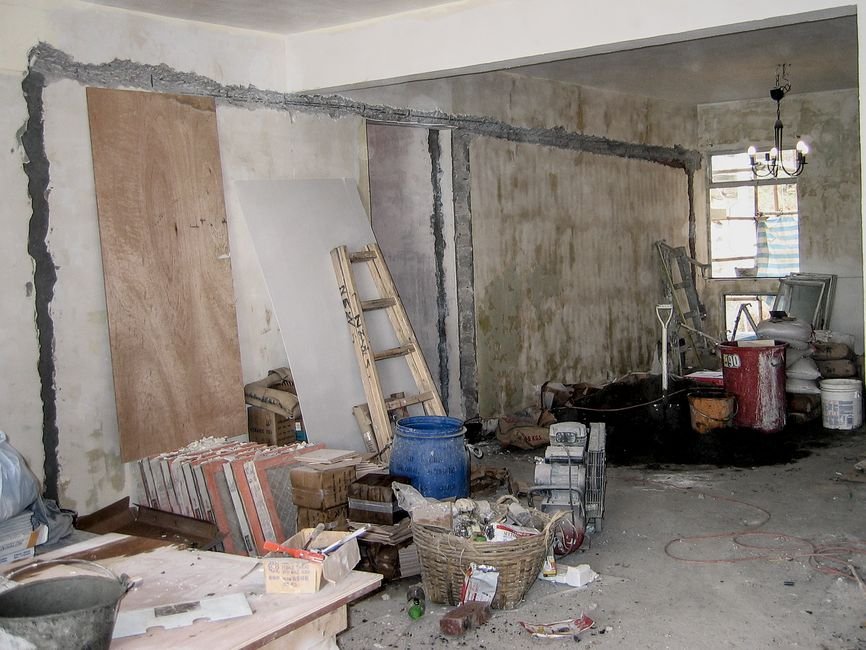
Your home is also a rich source of distractions. A recent survey of American telecommuters cited the top distractions as household chores, TV, pets, errands, the internet and kids. You’ll need discipline to get work done. And, if you are a Type-A personality, you may need discipline to stop working at the end of the day.
One tip: Buy a well-built, comfortable chair and set your home office up with proper ergonomics, light and ventilation. This will make a big difference to your comfort and productivity.
Getting creative
With a little creativity, you can enhance your experience. For example, one friend skipped the home office stage, and ran his IT startup from the Hong Kong Public Library, which has free air-conditioning and Wi-Fi, color photocopiers, comfortable chairs and quiet.
Another friend, a commercial artist, swapped desk space at a design firm for freelance work.
An editor friend sold her house in Australia and spends her time traveling, running marathons and working remotely. She’s now in New York City, but also works from Istanbul and Kuching. That may be extreme, but it illustrates what is possible.
I also know knowledge-based companies that have:
- Rented space inside a client’s office
- Had office space donated to them by a sponsor, with rent that increased slowly over time; and
- Sublet space in a Grade B office from another small business
The attraction to these arrangements is that they are cheap. With luck, you’ll get a great space at a bargain price. But you’ll need time and a good network to find these opportunities. These arrangements also tend to be short term.
Serviced offices
Now let’s look at renting a serviced office. In addition to meeting rooms, they offer turnkey packages—which include a receptionist, basic furniture, phone, broadband and mail services—for everything from one person to a multinational. Some offer videoconferencing and access to offices in different cities and countries. Business incubators offer a similar service for startups.
Serviced offices offer flexibility. You can rent them by the hour or by the year, and a long-term commitment is not required. You can increase or decrease the space you rent to meet changing circumstances. Serviced offices range from spartan to luxurious, and save you the cost and trouble of buying furniture and office equipment.
But serviced offices are like hotel minibars. They sell convenience at a price. If you rent or buy an office, you can get the same space for less money.
Think carefully about why you’re using a serviced office. If your goal is to escape distractions at home, you can rent a more modest facility than if you have frequent client meetings. And ensure the work environment fits your needs, whether that’s quiet space or opportunities to socialize with like-minded entrepreneurs.
Security is also important, particularly if you’re developing intellectual property, doing confidential client work or storing expensive equipment. Ask about the office’s security and access-control systems. And if you need to work on weekends or odd hours, ask if 24-hour access is available and whether air-conditioning is included.
Renting an office
Renting makes sense when you know your company is viable and how much space you’ll need. It gives you a sense of permanence and a “real company” feel that you won’t get at home or in a serviced office. But renting also adds complications and costs.
Typically, you will pay the landlord the first month’s rent and two months’ deposit when you rent a Hong Kong office. You will also pay half the stamp duty charges, which for a two year lease is 0.5% of the annual rent. And you’ll give the agent half a month’s rent for brokering the deal.
Finding a competent real estate agent is essential. The major agencies, such as Centaline, Midland and Ricacorp, as well as smaller, specialist companies have divisions specializing in small offices. Agents concentrate on specific neighborhoods, and their competence and language skills vary. Greatly. Personal referrals are a good way to find an agent. And you can help yourself by doing research beforehand, knowing which features are essential and which are optional, and by communicating your needs and priorities to the agent before you start looking.
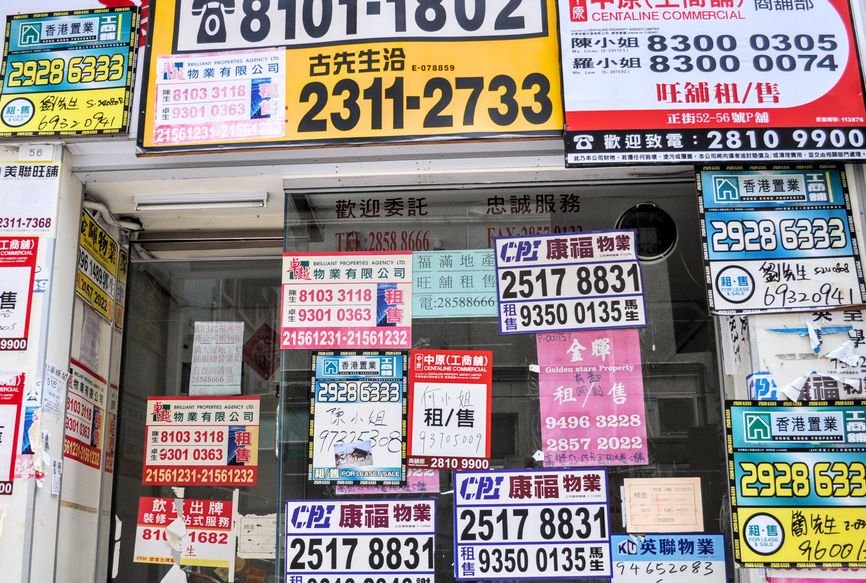
A typical lease is two years long. You may be able to negotiate a break-lease clause, which allows you to give the landlord two months’ notice after one year, for a minimum tenancy of 14 months. Many leases contain a clause that prohibit you from subletting the office, and some include a clause that gives the landlord the right to terminate the lease unilaterally, with notice. This can be a major pain if you have just spent a bundle on renovations.
Taxes and fees
The lease can include or exclude rates, government rent and management fees. Rates are a quarterly property tax. Recently, the government has been waiving rates, so it may be to your advantage to exclude this from the lease.
Government rent is a small charge payable for the use of the land under the building. Management fees are a monthly charge that pays for maintenance, security, cleaning and utilities, and common services like elevators and air-conditioning for the lobby.

The lease shown here can be purchased from stationery stores, is bilingual, and is commonly used by small landlords. It doesn’t contain any nasty surprises, and can be customized with a rider that covers things like a break-lease clause and furniture and fittings that are included in the rental.
Hong Kong property is sold and rented on a useable-floor-area basis. Depending on the building, the efficiency ratio, which is the ratio of usable space to gross floor area, can be as high as 90% or as low as 60%. The extra space is taken up by elevator shafts, lobbies and other things. Management fees are based on the gross floor area.
Hong Kong office grades
Building management also varies. While Grade A buildings, like International Finance Center or Exchange Square, are usually well managed, Grade B and C buildings, where most small businesses operate, can be hit-and-miss. It’s not unusual to find a security guard asleep on a cot in the hallway on weekends, or for the building to be closed on Sundays.
A word about building grades. Grade A buildings have central air-conditioning, large floor plates, parking, lots of elevators and nice lobbies. Grade B may have central air-conditioning and parking, and a less glamorous lobby. Finally, Grade C doesn’t have parking or central air-conditioning, and may only have one elevator and a basic lobby. The location has nothing to do with the grade: There are Grade A buildings, like Nina Tower, in Tseun Wan and Grade C buildings in the backstreets of Central.
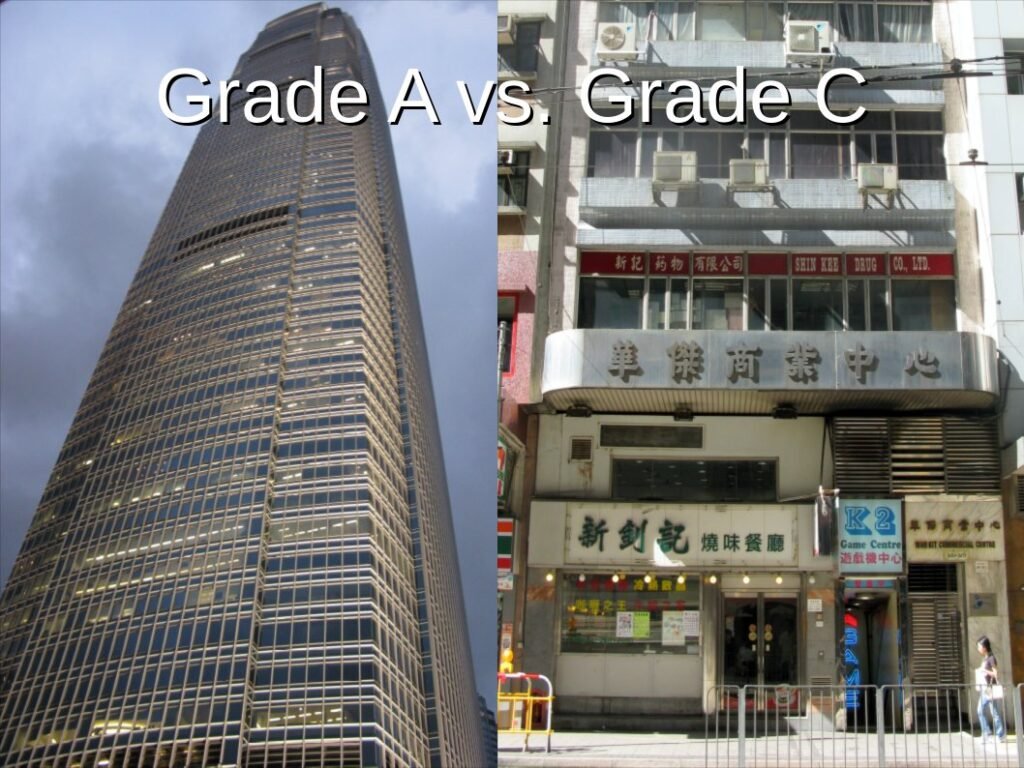
Before you sign anything, check the cleanliness of shared facilities like lobbies, elevators and toilets. Inspect the stairwells and fire escapes, which should be clear of debris. And visit the building outside office hours, to see how it is managed and to see what other tenants are doing. You may find yourself sharing a building with a private kitchen or unlicensed club.
Fitted or bare shell?
You’ll need to decide whether to rent an office that is fitted, bare shell, or something in between. If it’s a bare shell, you can usually negotiate a rent-free period while you are decorating. You may need to install air-conditioning, electrical wiring, phone and data lines, carpets, ceilings and window coverings, and internal partitions. Be sure to specify how the office will be returned to the landlord at the end of the lease—you may have to remove your improvements when you leave.
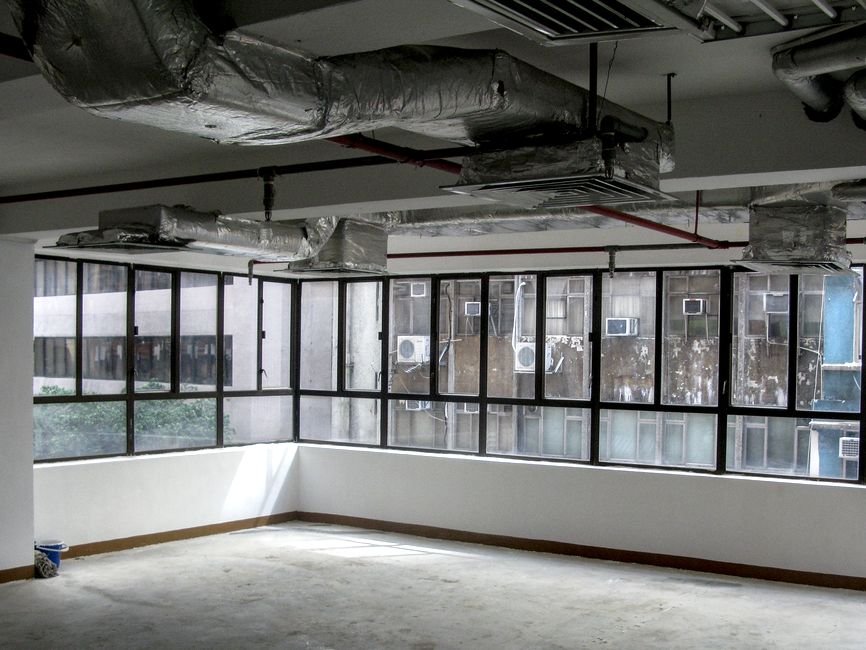
Consider the time you’ll need to hire and manage a designer and contractor. Finding a competent builder, who has registered under the Minor Works Control System, can be tough, especially when the property market is buoyant. In some buildings, you must use a nominated contractor, who is the only one authorized to work in the building. Avoid this, because nominated contractors are expensive and have few incentives to make you happy.
Some renovations need approval from the buildings owners’ committee or the Buildings Department. Don’t cut corners here—the Buildings Department can make you remove unauthorized alterations, even if they are safe. And avoid making changes to fire sprinklers. There are a limited number of contractors who are licensed to do this work, and they charge a lot.
In light of the above, a fitted office may be a cheaper, easier solution.
Air-conditioning
In addition to decorations, you’ll need to choose central or individual air-conditioning. With central air-conditioning, you have cooling during office hours and the ducting and fan coils are usually in place. But central air-conditioning comes with a higher monthly management fee. Central air is typically available from 8:30 AM to 6:30 PM and 8:30 to 1:30 on Saturday. That can be a pain if you have overseas clients, or if you start early. You can turn on the air-conditioning outside office hours, but there’s usually a fee of HK$300+ per hour and a minimum charge.
In some buildings, you can install individual split-type air-conditioners, which let you cool at will. Determining what size air-conditioner to buy is surprisingly complicated. Too small and you’ll burn out the compressor and never be comfortable. Too large and you’re paying more than you need to and the compressor will not be working efficiently, so get professional advice.
Compressors for split-type air-conditioners are normally mounted on the building’s outside wall, so it’s essential that you hire competent installers and insist on seeing proof of insurance. Falling equipment and debris can result in deaths, property damage, civil lawsuits and criminal charges.
Choosing a landlord
Another important choice is between a large, corporate landlord and a small one, who is often an individual investor. Both have advantages and disadvantages.
Large landlords are stable and impersonal. They often ask for things that I consider ridiculous: personal guarantees, three months’ deposit, unilateral break-lease clauses, restoration fees, etc. They will also waste your time by making you deal with minions who cannot make decisions.
Small landlords will often negotiate to avoid a vacancy—especially if you connect with them on a personal level—and can make fast decisions. Your rent means a lot more to a small landlord than it does to a big corporation. So they’ll take it personally if you pay late.
Small landlords can quirky. One of my landlords nearly electrocuted herself trying to rewire a light switch. Another installed a shiny black faucet in our pink bathtub.
Small landlords are also more likely to sell the office you are renting. If this happens, the new owner assumes the legal responsibilities of the old landlord, and your lease continues as if nothing has changed. The new owner must refund your deposit at the end of the lease.
Buying your office
Buying is the final rung on the ladder. It’s a big commitment, but it lets you lock-in your occupancy costs. And it insulates you from rent increases and the whims of a landlord. It can also be a good investment.
Unlike many places, Hong Kong has a mature, transparent property market. Legal protection is good, you don’t have to speak Chinese or be a resident to buy. There’s lots of liquidity in the market.
Hong Kong has many Grade B and C buildings where you can buy individual offices or whole floors. This is less common in Grade A buildings, which typically have a single owner. Offices can be sold with or without a tenant, and mortgages are freely available.
Everything I mentioned earlier—bare shell versus a fitted office; the need to investigate building management; and central versus individual air-conditioning—applies to an office purchase. These issues are even more important for buyers. That’s because, it’s harder and more expensive to unwind a purchase if you discover that you don’t like your office. As an owner, you are also liable for the cost of repairs and improvements, so you’ll want to pay close attention to expensive things like elevators, especially in older buildings.
Costs and prices
If you buy, you’ll pay 1% of the purchase price to the agent as commission. You’ll also pay stamp duty. And you’ll need to budget for legal fees, which are about $10,000 for a cash purchase.
Offices in older buildings generally sell for less than those in newer ones, which are more energy efficient and require less maintenance. Other factors that affect prices include the proximity to Central and the Mass Transit Railway, the quality of the neighborhood and the presence of sea views.
You can find asking and actual sales prices from the websites of large real estate agencies. Historical data is also available from the Hong Kong Government’s Land Registry.
Here are some recent prices, in Hong Kong dollars, from Hong Kong Island.

A home office can have negative cost, if you have empty space and can write off some of your rent and expenses against your income.
A basic, 90-square-foot room in a serviced office starts at $4,000 per month, including phone and internet services and a receptionist.
Rents for a 700-square-foot office in a Grade B building in Western start at about $11,000, or around $16 per square foot, plus rates and management fees.
You can buy space in the same Grade B building for about $6,500 per square foot, making the cost of a 700-square-foot office about $4.5 million. The monthly management fee for this building is $2.76 per square foot. And you can see the prices for Grade A space are a lot higher.
Case study
In 2002, I bought and renovated a 1,000 square-foot office in a Grade C building in Central. Here is what the office looked like before the rehab.

The office had been abandoned by its previous owner. There were no locks on the doors, the windows had been left open and the place was full of rubbish. It was a big project: Over six weeks, we installed a new electrical system, lights, ceiling and carpet, doors and built-in storage.
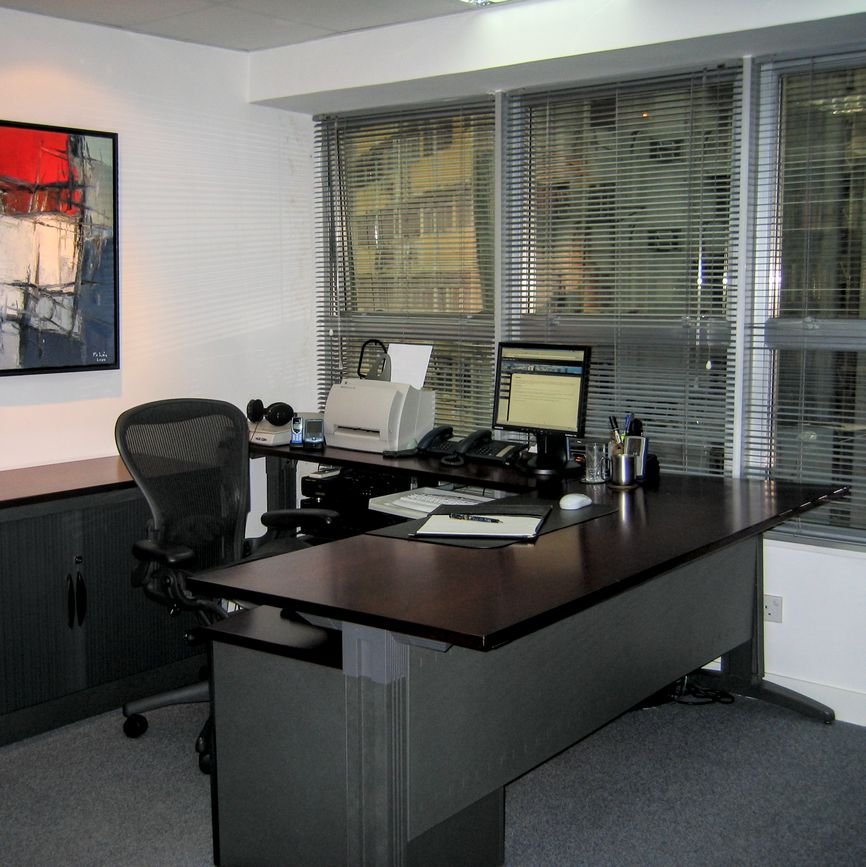
Here is a budget breakdown for the project. Some of the cost differ from the figures that I gave earlier because I bought during a downturn and was able to negotiate discounts. The stamp duty rates have also changed, but this will give you an idea of the costs involved.
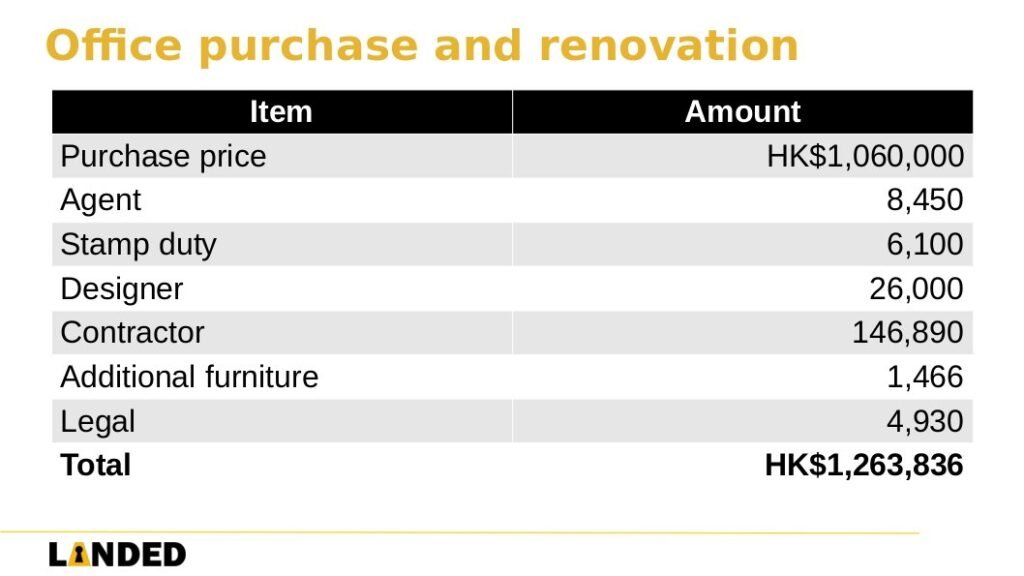
Finally, If you are thinking of buying, remember three things. Hong Kong real estate is volatile—some segments lost two-thirds of their value after the 1997 Asian Financial Crisis. It is sentiment driven and it is cyclical.
Which brings me to the most important part of the presentation, your questions.
Thank you!
Click here for more articles about property in Hong Kong.
This article was published on November 10, 2011, and updated on March 21, 2023.
Christopher Dillon has owned residential, industrial and commercial real estate in Hong Kong and Japan. He is the author of the Landed series of property books. The second edition of Landed Hong Kong is available from Amazon.